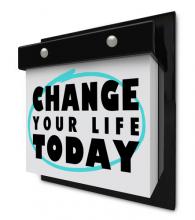self improvement

The top 10 or 20 bestselling books at Amazon.com vary slightly from hour to hour, day to day, but one thing remains pretty constant: There are always several books on spirituality, often with Protestant evangelical leanings; and there are always books on diet, promising either dramatic weight loss or astounding well-being through some “revolutionary” plan.
Even within the category of “Religion and Spirituality,” some of the most popular books focus on diet and bodily health, and when they don’t, they focus on happiness via the most direct route. They’re all about “how to be successful and happy,” “how to make miracles happen,” and “how to know that there really is a heaven, and that you’re going there.”
Having been a skeptic for as long as I can remember, I’ve never had much patience with those books. If books (and checkout-stand magazines, for that matter) really held the secrets for people to “get skinny by this weekend” or “beat cancer with these super-foods,” why did people from my church choose gastric bypass surgery, and why did my father (a pastor) perform so many funerals for the non-survivors of cancer? And if miracles could happen, and people could find success, happiness, and assurance of a place in a heaven that’s “for real,” why, throughout the course of my pious Bible-reading upbringing, did I never seem to find anything in the Bible that sounded remotely like that?